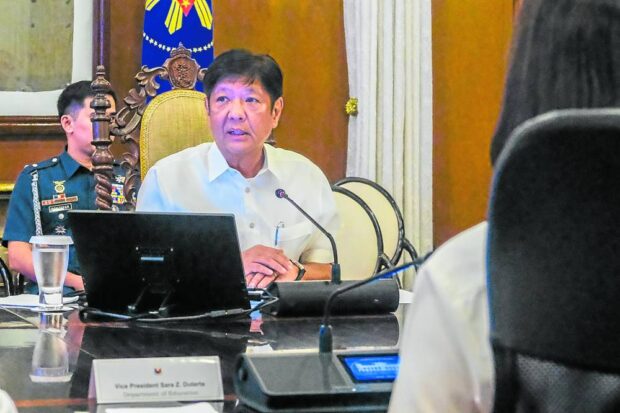
PPA POOL PHOTO
MANILA, Philippines — President Ferdinand Marcos Jr. has ordered the Department of Agriculture (DA) and other government agencies to pursue his administration’s whole-of-nation approach in assisting farmers hit by environmental phenomena, the El Niño and La Niña.
In a statement on Wednesday, the Presidential Communications Office (PCO) said Marcos had directed agencies involved in monitoring and managing the effects of the two phenomena to ensure public safety.
Particularly, PCO said DA was asked to “closely coordinate” with the Philippine Crop Insurance Corp. (PCIC) to “assess any regulation barriers imposed by the insurance commission,” to ensure that financial aid reaches the farmers quickly.
READ: Pagasa: Drought may hit 24 provinces due to El Niño
Gather data
“The Department of Environment and Natural Resources-National Water Resources Board (NWRB) is mandated to collaborate with the Office of the Civil Defense (OCD) to gather data on both water oversupply and undersupply situations,” PCO said.
“They are also ordered to engage in collaborative efforts to devise engineering solutions that alleviate the need for extreme water conservation measures and raise public awareness on the importance of constructing additional dams in mitigating the challenges posed by the El Niño,” it added.
With the intense heat due to the El Niño season, PCO said Marcos had asked the Bureau of Fire Protection to coordinate with the Department of Health in protecting vital health facilities from fire.
OCD, meanwhile, will work with the Department of Tourism to mitigate the El Niño’s effects on tourist areas.
READ: Gov’t to use various ways to address El Niño impacts in PH – Marcos
Fire hazards
“The Bureau of Fire Protection is also mandated to coordinate with the Department of Health to assess and implement requisite measures to ensure the safety of health facilities or hospitals from the threat of fire hazards,” PCO said.
“For its part, the OCD is tasked to closely work with (the) Department of Tourism (DOT) regarding the impact of the El Niño phenomenon on tourist areas, specifically addressing issues related to water availability, energy resources, public health and safety concerns,” it added.
The Philippine Atmospheric, Geophysical and Astronomical Services Administration (Pagasa) characterizes El Niño as the unusual rise in average sea surface temperatures (SSTs) in the central and eastern equatorial Pacific, resulting into warmer waters.
As an effect, below-normal rainfall is expected, which can cause dry spells and droughts in several areas.
Last February, Pagasa said that 23 provinces in Luzon and one in the Visayas may be affected by a drought due to the El Niño, saying that the phenomenon may persist until May.
Preparing for La Niña
However, Pagasa is also preparing for La Niña — the opposite of El Niño — where average SSTs are expected to be unusually cooler than average. It usually results in higher rainfall in many areas across the country.
READ: El Niño, La Niña together? What to know
According to Pagasa’s monitoring, El Niño is showing signs of weakening, which means that after its peak in April and May, the country may transition to El Niño Southern Oscillation–neutral conditions by June.
However, there is a 50 percent chance that La Niña develops after this period.
Last December 2023, Marcos revived a task force geared to respond to El Niño’s effects, in anticipation of the problems it may cause for the country. Then last March 2, Marcos Jr. assured the public that the government will use different strategies to deal with the effects of El Niño.